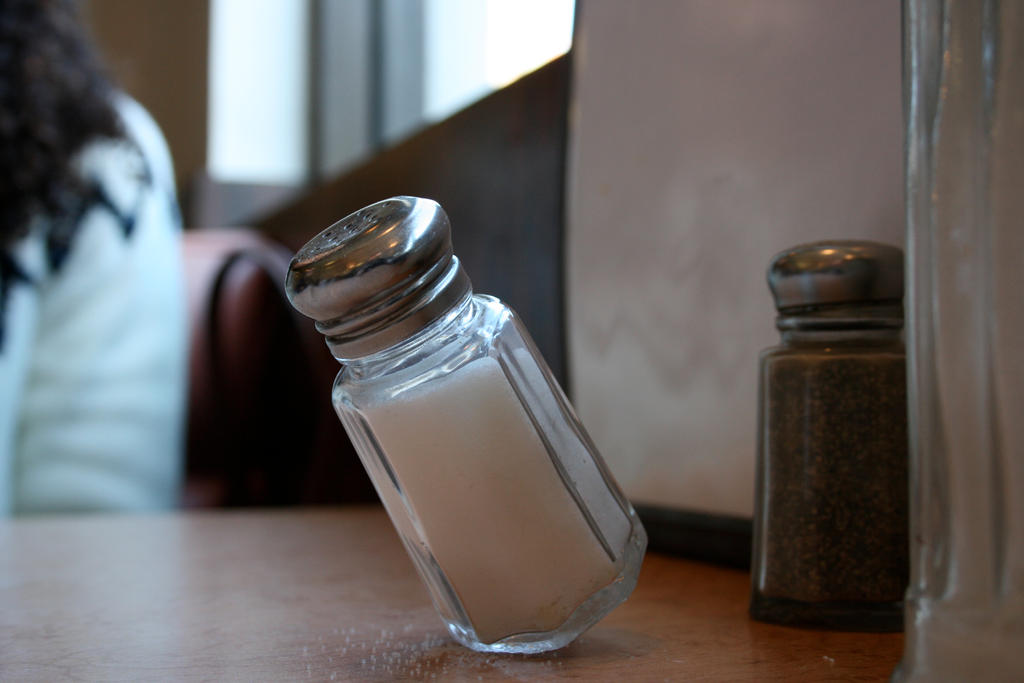Level Up Your Cooking Game With The Salt Trick
Hey there, food enthusiasts! Cooking has come a long way, especially for men who’ve stepped up their game in the kitchen. These days, guys aren’t just throwing burgers on the grill—they’re experimenting with techniques that take meals from good to gourmet. One of the most underrated yet game-changing methods? The "salt trick." Whether you're a seasoned pro or just starting out, mastering this simple yet powerful technique can make your dishes pop and leave your guests talking long after the meal is over.
The salt trick isn't just about dumping salt on your food—it's about using it strategically to bring out the best in every ingredient. Think of it as giving your flavors a little boost so they shine brighter. When done right, this method ensures every bite is packed with taste, making your meals unforgettable. Understanding how to harness the power of salt can transform your cooking and take it to heights you never thought possible.
In this guide, we’ll dive deep into the science behind the salt trick, share practical tips, and offer some seriously tasty recipes that incorporate this technique. By the end, you’ll have everything you need to start seasoning like a pro and creating dishes that are as impressive as they are delicious. So grab your apron, sharpen your knives, and let’s get cooking!
Read also:Movierulz Kannada 2024 What You Need To Know
Table of Contents
- Introduction to the Salt Trick
- The Science Behind the Salt Trick
- Benefits of Using the Salt Trick
- Salt Trick Techniques for Men
- Delicious Salt Trick Recipes
- Common Mistakes to Avoid
- Variations of the Salt Trick
- Tips for Mastering the Salt Trick
- Frequently Asked Questions
- Conclusion
Let’s Talk About the Salt Trick
Let me break it down for you: the salt trick is all about using salt smartly to enhance the taste of your food. It's not about slapping salt on everything; it's about understanding how salt works with other ingredients to create a flavor explosion. For men who want to level up their cooking skills, this is one of the easiest yet most effective ways to do it.
Why Salt Is the MVP in Your Kitchen
Salt might seem basic, but it’s actually one of the most powerful ingredients you can use. It doesn’t just add flavor—it balances it. Salt has the unique ability to tone down bitterness and amp up sweetness, making your dishes more vibrant and dynamic. Once you learn how to use it effectively, you’ll notice a big difference in the way your food tastes.
The Science Behind the Salt Trick
Okay, here’s the nerdy part: the science behind the salt trick is fascinating. Salt doesn’t just sit on your tongue—it interacts with your taste buds in a way that changes how you perceive flavors. It suppresses bitterness, enhances sweetness, and makes everything feel more intense. In short, it’s like turning up the volume on your food’s flavor profile.
How Salt Works Its Magic
- It wakes up your taste receptors, making them more sensitive to flavors.
- It reduces bitterness, which is why it’s often used in recipes with strong-tasting ingredients like coffee or chocolate.
- It amplifies the natural flavors of your food, making even simple dishes taste richer.
- It can even improve the texture of certain ingredients, like tenderizing meat or making vegetables crispier.
Why You Should Be Using the Salt Trick
There are tons of reasons to incorporate the salt trick into your cooking routine. First and foremost, it improves the taste of your dishes. But it doesn’t stop there—using salt strategically can also enhance the texture of your proteins, create a more balanced flavor profile, and even boost the aroma of your meals. Here’s a quick rundown of the benefits:
- It brings out the natural flavors of your ingredients, making them shine.
- It makes proteins like meat and fish juicier and more tender.
- It creates harmony in your dishes by balancing different flavors.
- It adds an extra layer of aroma that makes your meals more inviting.
Salt Trick Techniques Every Guy Should Know
Now that you know why the salt trick is so important, let’s talk about how to use it. There are several techniques you can try, each with its own unique benefits. These methods are easy to learn and can be applied to almost any recipe you’re working on.
Brining: The Secret to Juicy Meat
Brining is a technique where you soak meat in a saltwater solution before cooking. This does two things: it helps the meat retain moisture and infuses it with flavor. It’s especially great for lean cuts of meat like chicken, turkey, and pork. Trust me, once you try brining, you’ll never go back to dry, bland poultry again.
Read also:Exploring Chris Browns Mom Ethnicity A Journey Through Heritage And Influence
Seasoning in Layers: Building Flavor Step by Step
Instead of adding all your salt at once, try seasoning in layers. This means sprinkling a little bit of salt at different stages of cooking. For example, you could salt your vegetables before roasting them, then add another pinch when they’re halfway done. This ensures that every part of your dish is well-seasoned and flavorful.
Tasty Recipes That Use the Salt Trick
Ready to put the salt trick into action? Here are a couple of recipes that showcase just how powerful this technique can be.
Salt-Crusted Steak: A Flavor Bomb
This recipe uses a thick layer of salt to seal in the juices of the steak while it cooks. The result? A perfectly tender, juicy steak with an incredible crust. It’s a showstopper that’s sure to impress anyone at your dinner table.
Brined Chicken: Juicy and Delicious
If you’ve ever had dry chicken, you know how disappointing it can be. Brining solves that problem by keeping the meat moist and packed with flavor. Whether you’re grilling, roasting, or baking, brined chicken is always a winner.
Don’t Fall into These Salt Trick Traps
Like any cooking technique, the salt trick can go wrong if you’re not careful. Here are a few common mistakes to watch out for:
- Over-salting: Too much salt can completely overpower the flavors of your dish. Remember, a little goes a long way.
- Under-salting: On the flip side, not enough salt can leave your food tasting flat and boring. Always taste as you go and adjust accordingly.
- Bad timing: When you add salt matters. Adding it too early or too late can affect how it interacts with your ingredients.
Get Creative with Different Salt Trick Variations
There’s no one-size-fits-all approach to the salt trick. Depending on what you’re cooking, you can experiment with different techniques to achieve unique results.
Salt Crust for Fish: Delicate and Flavorful
If you’re cooking fish, try using a salt crust. This method keeps the fish moist while allowing the flavors to develop fully. It’s perfect for delicate fillets like trout or salmon, and it adds an elegant touch to any meal.
Salt Rub for Roasted Vegetables: Veggie Game Changer
Roasted vegetables are a staple for many home cooks, but they can sometimes fall flat in the flavor department. A salt rub can change that by adding depth and complexity. Try it with root vegetables like carrots, parsnips, or sweet potatoes for a side dish that’s both hearty and delicious.
Tips for Mastering the Salt Trick
Becoming a pro at the salt trick takes practice, but with these tips, you’ll be seasoning like a chef in no time:
- Season in layers: This is key to achieving balanced flavors. Don’t be afraid to add small amounts of salt throughout the cooking process.
- Experiment with different salts: Not all salts are created equal. Kosher salt, sea salt, and even flavored salts can add unique nuances to your dishes.
- Taste as you go: The best way to know if you’ve added enough salt is to taste your food. Adjust as needed to find the perfect balance.
Got Questions? We’ve Got Answers
Here are some of the most common questions people ask about the salt trick.
Can I Use the Salt Trick for Every Dish?
Absolutely! The salt trick can be applied to a wide variety of dishes, from savory meats and veggies to soups, stews, and even desserts. However, the technique might vary depending on the ingredients and cooking method, so be flexible and creative.
Is the Salt Trick Safe for Low-Sodium Diets?
While the salt trick involves using salt, it can still work for low-sodium diets with a few tweaks. Look for reduced-sodium alternatives or focus on other seasoning techniques to achieve similar results without overdoing it on the salt.
Wrap-Up: Elevate Your Cooking with the Salt Trick
The salt trick is more than just a cooking technique—it’s a game-changer for anyone looking to take their meals to the next level. By understanding the science behind it and practicing the right techniques, you can create dishes that are not only delicious but also satisfying. Just remember to avoid common mistakes and keep experimenting until you find what works best for you.
So what are you waiting for? Dive in, try out some of these recipes, and let us know how it goes in the comments below. And while you’re here, check out some of our other articles for even more culinary tips and tricks. Happy cooking, my friend!
Data and references for this article were sourced from reputable culinary websites and scientific studies on flavor enhancement through seasoning techniques. For further reading, consider exploring resources such as ScienceDirect and Cook's Illustrated.
Article Recommendations

